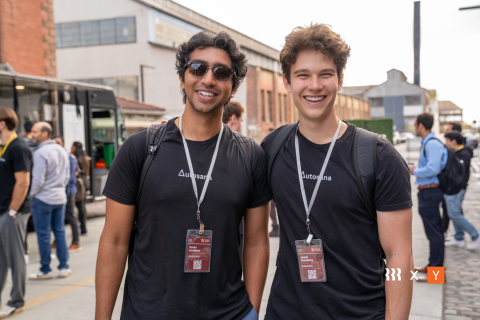Recent News & Accomplishments
2026
UMD Ph.D. student Geonsun Lee leads “Sensible Agent” project with Google Research to examine proactive AR assistants designed to adapt to real-world context.
When digital assistants first appeared on personal computers, they often waited for users to type a command or click a button. As wearable technologies move closer to everyday use, researchers are asking a different question: What if an assistant could offer help at the right moment without being asked and without interrupting? At the University of Maryland Department of Computer Science, Ph.D. student Geonsun Lee is studying that shift. Lee is the lead author of “ Sensible Agent ,” a project developed in collaboration with Google Research that examines how augmented reality assistants can... read more
In an era where microbiome research reveals significant insights into human health, ecosystems and disease, researchers face a central challenge: making sense of fragmented sequencing data. They must piece together millions of DNA fragments to reconstruct the genomes of thousands of microorganisms in a single sample—a task that demands sophisticated algorithms and novel methods to interpret complex data. Marcus Fedarko , a postdoctoral associate at the University of Maryland Institute for Advanced Computer Studies (UMIACS), is tackling this problem head on. He has returned to the University... read more
Inspired by a college internship, Russell Schwartz (B.S. ’22, mathematics, B.S. ’22, computer science) is taking his passion for mathematics all the way to the moon.
From the time he was a kid growing up in Ellicott City, Maryland, Russell Schwartz (B.S. ’22, mathematics, B.S. ’22, computer science) was obsessed with all things space, from NASA missions to science fiction. “I remember when I was really young, I was super into space and space exploration, that was my big thing,” Schwartz said. “I grew up learning about the Gemini and Apollo missions and the shuttle program and watching shows like Star Trek, and my room was constantly decorated with all kinds of space stuff. It was all just incredibly inspiring.” Schwartz never outgrew that fascination. Now... read more
Department of Computer Science alumni Yuvan Sundrani and Jason Steinberg build Autosana, an AI testing platform accepted into Y Combinator’s 2025 batch.
When mobile & web apps release updates, engineers must ensure new features work properly without disrupting existing ones. That process often involves writing and maintaining detailed test scripts, which frequently break as apps evolve. Fixing those scripts can slow development and consume valuable engineering time. University of Maryland Department of Computer Science alums Yuvan Sundrani (B.S. ’24, computer science; B.S. ’24, information science) and Jason Steinberg (B.S. ’24, computer science; B.S. ’24, general business) saw those challenges firsthand. In 2025, they launched Autosana... read more
Modern cloud services rely on telemetry—the collection, transmission, and analysis of data—to monitor and ensure that systems are healthy, performant and reliable. But gathering and analyzing this data at scale is often expensive and slow, forcing engineers to balance trade-offs between performance, cost and accuracy. Zeying Zhu, a fifth-year computer science doctoral student at the University of Maryland, is working to overcome these limitations. “Modern telemetry systems should be high-performance, scalable and inexpensive, but today’s solutions struggle to achieve all three at once,” she... read more
He discusses his path into computer science, research on cloud infrastructure and mentoring students in systems research.
Alan Zaoxing Liu , an assistant professor of computer science at the University of Maryland, studies how computing systems manage and move data at scale. His work focuses on designing data systems that support large cloud platforms and artificial intelligence workloads, with an emphasis on reliability, performance and trustworthiness. Liu received his Ph.D. in computer science from Johns Hopkins University in 2019 and completed postdoctoral research at Carnegie Mellon University’s CyLab. At UMD, he leads the FROOT lab, where students build faster, more reliable computing infrastructure. In a... read more
A new partnership between NVIDIA and Universal Music Group will harness Music Flamingo’s groundbreaking ability to discern the finer points of music.
Music Flamingo , developed by University of Maryland and NVIDIA researchers, is at the center of a recently announced partnership between NVIDIA and Universal Music Group (UMG) that aims to revolutionize how fans discover songs and how musicians create them. The partnership “unites the world’s leading technology company with the world’s leading music company in a shared mission to harness revolutionary AI technology to dramatically advance the interests of the creative community,” said Sir Lucian Grainge, UMG’s chairman and CEO, in a statement on the deal. Streaming services’ current music... read more
An undergraduate and a high school student among those presenting at IEEE ICRA 2026 in Vienna.
Student researchers who participated in the University of Maryland’s Research Experiences for Undergraduates (REU) program, known as REU-CAAR, have had their work accepted to the 2026 IEEE International Conference on Robotics and Automation , scheduled for June 1 through 5 in Vienna, Austria. The paper was authored by Yufan Chen , an undergraduate student at the University of Southern California; Arnav Bali , a student at South River High School in Edgewater, Maryland; UMD alumni Angela Liu (M.S. ’24, computer science) and Laura Zheng (Ph.D. ’25, computer science); and Distinguished... read more
While machine learning has transformed everything from health care to natural language processing, understanding the limits and capabilities of this AI-based technology requires careful theoretical study. Han Shao , who joined the University of Maryland last fall as an assistant professor of computer science, is currently focused on bridging theory and application to understand what machine learning algorithms can—and cannot—do. “I am trying to understand the limitations of algorithms and figure out how to build better ones,” says Shao, who holds an affiliate appointment in the University of... read more
How CS major Amedeo Ercole helped develop a minimalist social app.
Social networking platforms are built to keep users scrolling, liking and reacting, often delaying direct interaction in favor of curated feeds. For Amedeo Ercole , that structure raised a simple question: What if conversation came first instead? A senior majoring in computer science at the University of Maryland, Ercole has spent the past year helping to develop Vex , a mobile app that connects users around shared interests with as few interactions as possible. The platform allows users to state what they want to talk about and be matched with someone interested in the same topic, removing... read more









